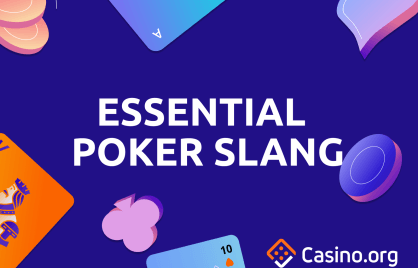Why ‘Emotional Bankroll’ Management Matters Just as Much as Your Chips
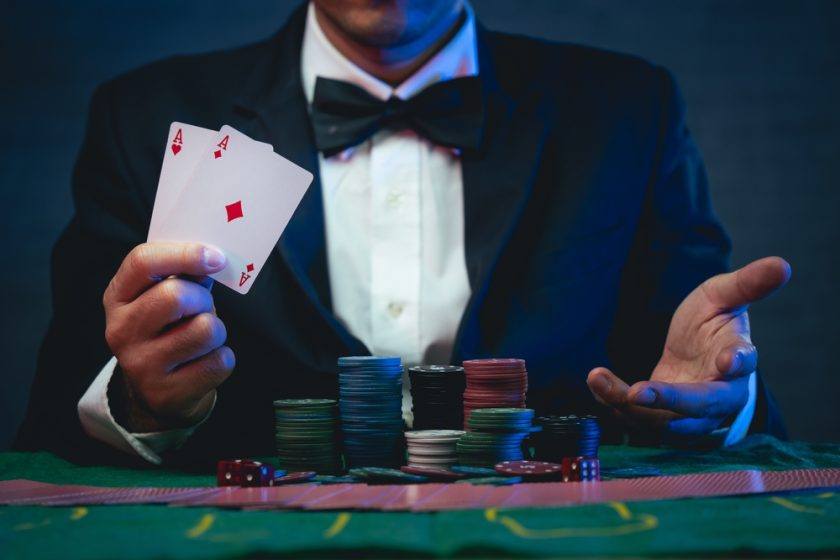
Summarize this post
Emotional Bankroll in Poker: What You’ll Learn
- Understanding Emotional Bankroll: Learn what an emotional bankroll is and how it affects your decision-making and performance in poker.
- Impact of Stress and Swings: Discover how the emotional swings that accompany gambling can influence gameplay and lead to poor decisions if not managed properly.
- Identifying Triggers: Explore common emotional triggers in poker, such as bad beats and losing streaks, and learn techniques to recognize and address them effectively.
- Strategies for Management: Gain practical strategies for maintaining a healthy emotional bankroll, including mindfulness techniques, setting limits, and knowing when to take breaks.
- Building Resilience: Understand the importance of emotional resilience and how developing this skill can improve your overall poker experience and long-term success.
Every poker player understands the importance of protecting their bankroll. You track your wins and losses, calculate your ROI, and make sure you’re not playing stakes you can’t afford.
But there’s another type of bankroll that doesn’t get nearly enough attention, and it might be the one that’s quietly costing you the most.
I’m talking about your emotional bankroll, which is your internal capacity to handle the stress, swings, and uncertainty that come with playing this game seriously.
Because, as we all know, poker is psychologically demanding. Even when you’re technically sound, it doesn’t take much—a bad beat, a mistake, a session that spirals—to throw you off your game. And if you’re not actively managing your emotional energy, you might find yourself reacting to small things, avoiding play altogether, or making decisions you later regret.
The problem? Most players wait until they’re on the brink of burnout before they notice something’s wrong.
In this article, we’re going to change that. I’ll walk you through what an emotional bankroll is, how it gets drained, and—most importantly—how to protect and replenish it so you can show up as your best, clearest-thinking self at the table.
Because it’s not just about how many chips you have—it’s about how much mental fuel you have left to use them wisely.
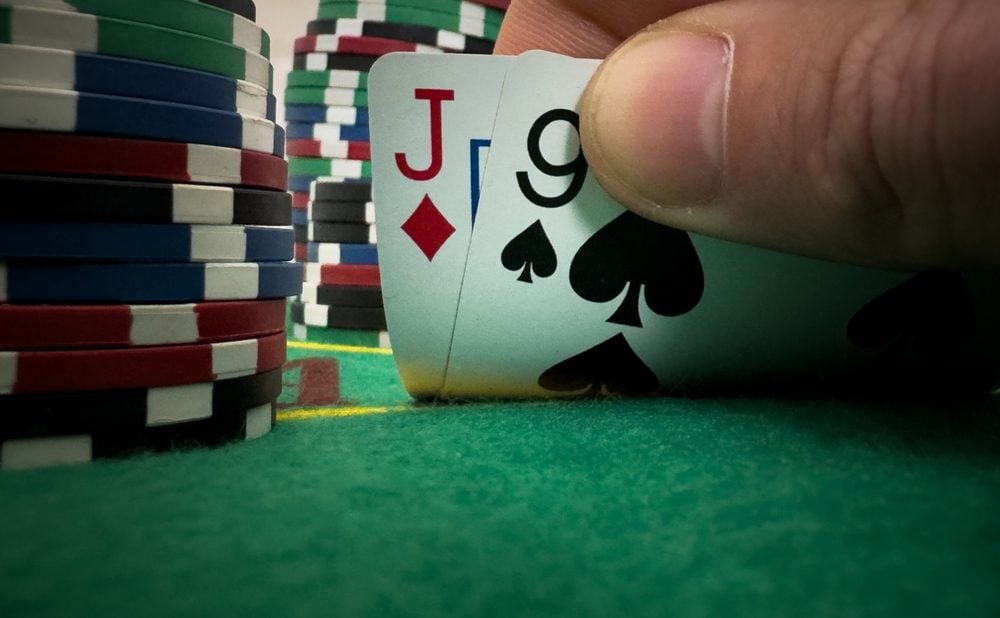
Image Credit: Andrew Angelov/Shutterstock
What Is an Emotional Bankroll?
You already know what a chip bankroll is: it’s the stack of money you use to play the game. You protect it with discipline, proper game selection, and wise decisions.
Your emotional bankroll works the same way, but it’s far less visible.
It’s your reservoir of mental and emotional energy. It determines how well you can:
- Stay focused during long sessions
- Bounce back from mistakes or bad beats
- Make good decisions under pressure
- Handle swings without spiraling
- Stay motivated even during a downswing
When your emotional bankroll is healthy, poker feels manageable—even fun. You stay composed, review mistakes without shame or fear, and show up with the mindset needed to improve and win long-term.
But when your emotional bankroll is depleted, everything starts to feel harder. You might:
- Overreact to minor setbacks
- Feel triggered by chatbox comments or dealer mistakes
- Play “just to escape” instead of with a clear purpose
- Quit sessions early or grind while emotionally checked out
- Avoid playing altogether out of fear, tilt, or fatigue
This is emotional burnout. It doesn’t happen all at once, but the psychological weight of variance, pressure, and unmet expectations increases over time.
And just like going broke financially, going broke emotionally can take you out of the game.
The good news? With awareness and the right tools, you can learn to manage your emotional energy just like your bankroll by building it up during the good times and protecting it when things get tough.
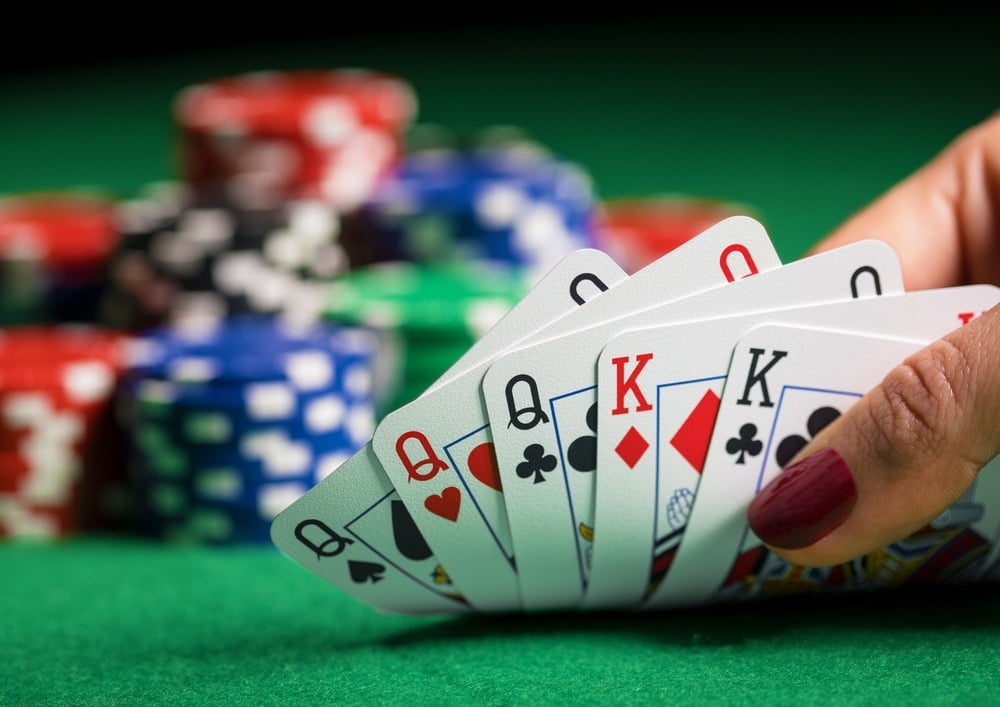
Image Credit: Andrew Angelov/Shutterstock
What Drains Your Emotional Bankroll?
Just like poor bankroll management leads to chip losses, poor emotional hygiene leads to mental fatigue, burnout, and tilt.
The key to protecting your emotional reserves is knowing what drains them, so you can catch the warning signs early and take preventative action.
Here are the most common culprits:
Variance + Bad Beats
Even the most seasoned players can feel emotionally rattled after a string of coolers and bad beats.
When you do everything “right” and still lose, it creates a kind of psychological whiplash. And if you’re not mentally prepared for the natural ups and downs of poker, this can leave you feeling discouraged, frustrated, or even personally attacked by the deck.
Drain signal: You find yourself obsessing over bad beats or replaying losses in your head long after the session ends.
Unrealistic Expectations
Wanting to get better fast isn’t the problem. It’s expecting progress to be linear or smooth. Poker improvement is messy. You’ll study something, apply it, and still lose sometimes.
When your expectations are too rigid (“I should be winning by now”), every session feels like a referendum on your worth as a player.
Drain signal: You feel like a failure after any losing session, even when your decisions were solid.
Lack of Recovery Time
Back-to-back sessions. Endless hand reviews. Studying while tilted. These can all look like discipline, but you’re silently eroding your emotional stamina if you’re not giving your brain time to reset.
Drain signal: You feel mentally foggy, irritable, or emotionally flat—even when you’re not actively playing.
Your Identity Is Tied to Your Results
When your confidence rises and falls with your win-rate, your emotional bankroll becomes hostage to short-term outcomes.
You’re no longer playing to improve or execute well. Instead, you’re playing to “prove” something to yourself or others. And that’s exhausting.
Drain signal: A single bad session ruins your whole day or derails your motivation entirely.
Mental Game Leaks
We all have them. Entitlement tilt. Perfectionism. Fear of failure. Trying to avoid mistakes instead of learning from them.
These leaks drain emotional energy before a session even begins—and they get worse when ignored.
Drain signal: You think, “I have to win today,” or “I can’t make any mistakes,” before your session even starts.
Recognizing these patterns is step one. Step two is learning how to guard your emotional bankroll with intention, so you can stay mentally resilient, even when poker throws its worst at you.
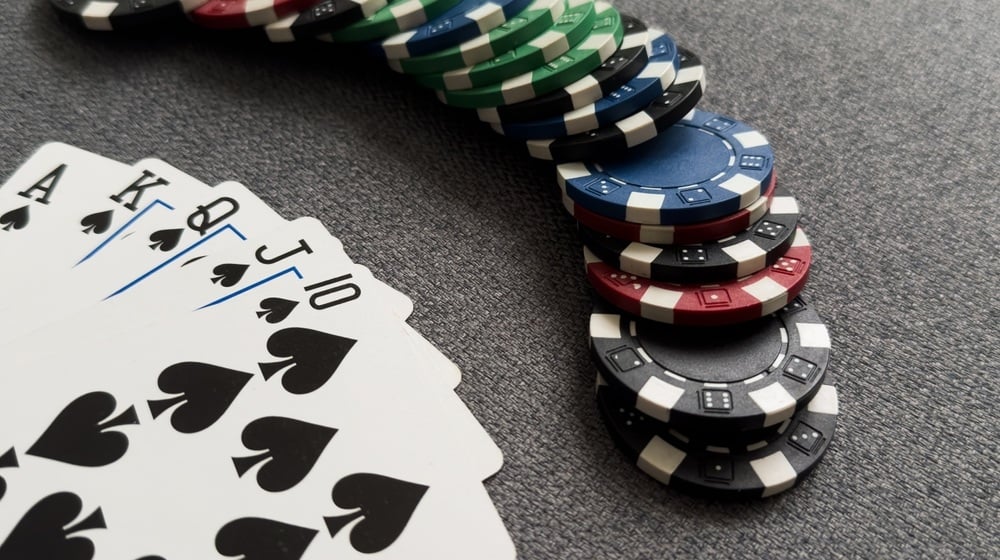
Image Credit: Andrew Angelov/Shutterstock
How to Protect and Replenish Your Emotional Bankroll
You wouldn’t risk your entire chip bankroll on one session without safeguards in place. So why treat your emotional energy any differently?
Protecting your emotional bankroll means recognizing when you’re reaching your limits and having tools to step back, reset, and come back stronger. Here are five strategies to help you do just that:
1. Use Stop-Losses for Your Emotions (Not Just Your Chips)
Everyone knows about financial stop-losses, but you should also set a mental stop-loss.
If you feel yourself tilting, losing focus, or slipping into frustration, that’s your cue to walk away before you punt off stacks.
Try this: Set a simple boundary:
“If I feel 6/10 or higher on the tilt scale, I’ll take a break no matter my chip count.”
This helps you protect your future sessions, not just the current one.
2. Build In Recovery Days
Poker is cognitively and emotionally intense. If you’re grinding nonstop, your mental game will erode even if you’re not aware of it.
Solution: Treat recovery like a performance strategy, not a luxury.
Take scheduled “off days” where you don’t think about poker. Do things that restore your energy: enjoy nature, exercise, laugh, engage in creative hobbies, and/or sleep.
Recovery refills your tank so you can show up sharp.
3. Track Mood and Mental State Like You Track Hands
Many players review EV graphs religiously but never stop to ask: “How did I feel before and after that session?”
Create a simple emotional log:
After each session, jot down:
- Mood going in (1–10)
- Emotional state afterward (tilt, energy, focus)
- One thing you did well mentally
- One thing to adjust next time
You’ll start to see patterns that will help you learn how to protect your edge.
4. Detach Your Identity from Results
Your win-rate doesn’t determine your worth. If you tie your identity to the outcome of each session, your emotional reserves will burn out fast.
Instead, root your identity in how you show up.
Try a mindset shift that’s tied to your goals:
- “I am a process-focused player who learns from every session.”
- “I measure success by my decisions, not just my results.”
Confidence becomes more stable when it’s not riding the variance rollercoaster.
5. Add a Post-Session Mental Cooldown
Like athletes stretching after a workout, poker players benefit from a short “warm-down” to offload emotional tension.
Try this quick reset:
- Write down one decision you’re proud of
- Acknowledge any frustration or mistakes, without judgment
- Take two deep breaths and mentally close the session
This simple practice helps you leave the game at the table and prevents emotions from spilling into the rest of your day.
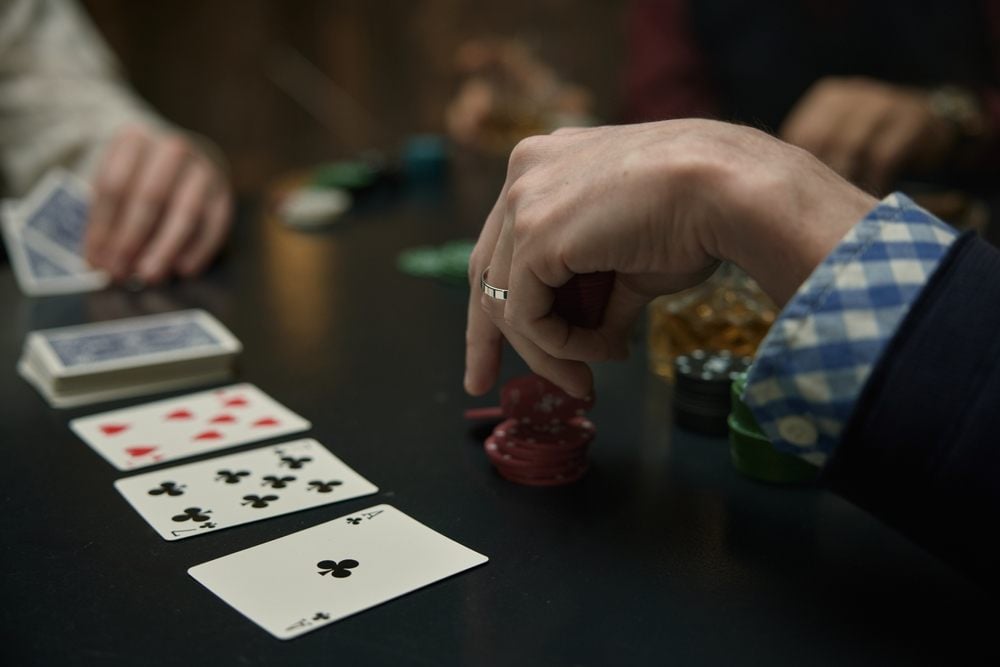
Image Credit: Andrew Angelov/Shutterstock
Rebuilding After Emotional Bust-Outs
Sometimes, despite your best efforts, you hit emotional rock bottom.
You’re not just tilted—you’re exhausted. You dread opening the client or going to the casino. You question whether you even want to keep playing. You’re short on patience, long on self-doubt, and burned out from the inside out.
That’s a sign your emotional bankroll has bottomed out.
And just like a chip bankroll, it’s rebuildable, but you must stop digging and start recovering.
Here’s a simple 3-step reset protocol to help you get back on track:
1. Pause + Reset
First, give yourself permission to step away.
Take 24–72 hours with zero poker. No hand reviews, no strategy videos, no checking the lobby. Your brain needs time to quiet the noise and regulate.
This isn’t quitting. It’s recovery, and it’s essential for rebuilding clarity and perspective.
2. Reflect with Curiosity, Not Judgment
When you’re ready, look back—not to beat yourself up, but to understand.
Ask:
- What triggered this emotional bust-out?
- Was I overplaying? Overstudying? Avoiding other stressors in my life?
- Which emotions kept showing up, and how did I respond to them?
Use a compassionate lens here. The goal is to gain insight, not to shame yourself.
3. Restart with Intention
Don’t jump back into full-volume play right away.
Instead, ease in with a short session and a clear mental boundary:
- “I’m not here to prove anything today.”
- “I’m rebuilding slowly, one decision at a time.”
Make sure to use warm-up and cooldown routines. Celebrate your process wins, and track how your energy feels, not just your results.
Emotional bust-outs are part of the poker journey. What matters isn’t avoiding them, but how you respond when they happen.
The players who learn to bounce back calmly, intentionally, and with self-awareness are the ones who stay in the game for the long haul.
Final Thoughts: Protect the Player, Not Just the Bankroll
Bankroll management is a given for serious players, but emotional bankroll management keeps you in the game for the long haul.
It’s easy to overlook your mental and emotional energy when you’re focused on EV, graphs, and climbing stakes. But poker isn’t just about making good decisions in a vacuum. It’s about making those decisions consistently, across sessions, swings, and setbacks.
That requires emotional fuel. Your emotional bankroll powers your focus, your resilience, and your ability to bounce back when things don’t go your way. And like any resource, it needs protection, maintenance, and occasional replenishment.
So before your next session, ask yourself:
“Am I in the right headspace to play my best game today?”
If the answer is no, don’t ignore it. Pause. Reset. Protect your mindset like it’s part of your strategy—because it is. Chips come and go, but your ability to stay sharp, centered, and grounded? That’s what keeps you winning over time.
Title Image Credit: Andrew Angelov/Shutterstock


